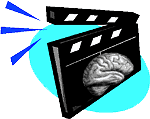 | Movie Amnesia vs. Real
Amnesia Hollywood rarely portrays amnesia accurately |
 December 28, 2004
December 28, 2004The film industry has always been fascinated with the brain. Although amnesia is a theme often used in movies, Hollywood rarely portrays memory problems accurately. That's the opinion of neuropsychologist Sallie Baxendale of the National Hospital for Neurology and Neurosurgery (London, England).
Dr. Baxendale points out that in real life, people with amnesia may have
trouble learning and remembering new information, but they usually have
normal intelligence and attention spans. Also, their personality is
usually not changed. The most common causes of real amnesia are brain
surgery, brain infection, stroke and head trauma. In Dr. Baxendale's
review of 60 movies released between 1915 and 2004, a dramatic car
accident or assault is usually the cause of amnesia. After such an
accident or assault, victims in movies often lose their personality and
identity. Traumatic events often cause movie characters to suffer from amnesia. Surviving a shipwreck, seeing a violent assault or living through a war can cause movie amnesia. Movie assassins, such as Jason Bourne in The Bourne Identity (2002), appear particularly susceptible to amnesia.
People with amnesia do have significant problems learning new information
and may have difficulties with everyday tasks. Dr. Baxendale reports that
the movies Memento (2000) and Finding Nemo (2003) do a good
job portraying a realistic view of amnesia. In Memento, the lead
Unfortunately, Hollywood presents situations that have little or no scientific or medical basis. For example, a common cure for amnesia is a hit to the head. Dr. Baxendale calls this method of recovery from amnesia the "two is better than one" approach. It is highly unlikely that a severe blow to the head will produce a miraculous, often immediate, recovery from amnesia. Other Hollywood treatments for amnesia include seeing a familiar object from the past, neurosurgery and hypnosis. Filmmakers are free to make movies any way they choose. However, it is important that movie viewers are able to separate fact from fiction. |
Reference and further information:
Recent movies with amnesia themes:
|
| GO TO: | Neuroscience In The News | Explore the Nervous System | Table of Contents |
![[email]](./gif/menue.gif) Send E-mail |
 Fill out survey |
 Get Newsletter |
 Search Pages |
 For example, in the film Overboard (1987), Goldie Hawn's character
falls from a boat, suffers amnesia, and goes from a rich, spoiled woman to
a loving, caring mother. These personality changes are unrealistic.
For example, in the film Overboard (1987), Goldie Hawn's character
falls from a boat, suffers amnesia, and goes from a rich, spoiled woman to
a loving, caring mother. These personality changes are unrealistic. character cannot form new memories (anterograde amnesia), but retains
his old memories and personality. Dori, the little fish in Finding
Nemo, displays many true symptoms of amnesia such as the inability to
remember new information, names and places.
character cannot form new memories (anterograde amnesia), but retains
his old memories and personality. Dori, the little fish in Finding
Nemo, displays many true symptoms of amnesia such as the inability to
remember new information, names and places.